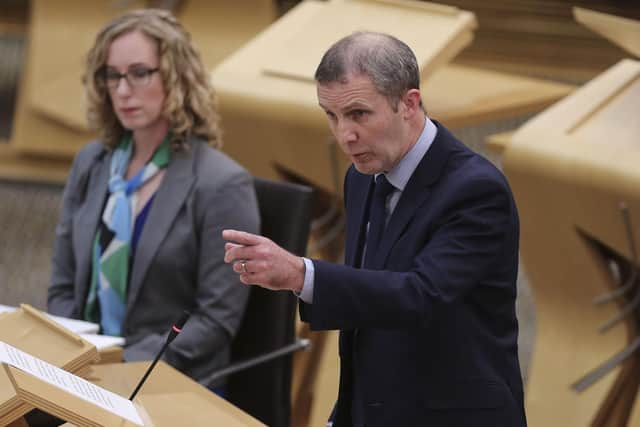Scottish independence: Independent Scotland would not stop drilling for oil and gas, says net zero secretary
Speaking exclusively to The Scotsman, Scotland’s net zero secretary Michael Matheson said the country would continue to “require an access” to oil and gas if it became independent, justifying the continuation of new oilfields.
Mr Matheson also said he did not accept the economic case for independence ahead of the 2014 referendum in the White Paper, which was heavily dependent on a continued rise in oil and gas prices, was wrong.


Advertisement
Hide AdAdvertisement
Hide AdHowever, he added that any new White Paper ahead of a potential independence referendum – currently slated for 2023, according to the Scottish Government’s timeline – would focus on Scotland’s renewables industry.
His comments come just over a week after Nicola Sturgeon said it was “fundamentally wrong” for Scotland and other countries to continue exploring and extracting oil and gas until the last possible moment.
The First Minister had labelled the challenge for countries such as Scotland with large oil and gas industries as the “most difficult” question in regards to how they tackle climate change.
Asked whether that means an independent Scotland would stop new oil and gas drilling on the first day of independence from the rest of the United Kingdom, Mr Matheson was clear.


"No it doesn’t,” he said, “because we’re still some way off from decarbonising our society and we will still require an access to a level of hydrocarbons.”
Mr Matheson said an independent Scotland’s licencing system would have to balance the requirements for hydrocarbons within the economy alongside the target to hit net zero by 2045, stating the alignment of these two pressures is “critical”.
The senior SNP figure said many of Scotland’s climate targets would be impacted by the actions of the UK Government due to the devolution settlement.
Mr Matheson said: “This is part of the challenge you have within a devolved settlement in Scotland, is that we have got statutory targets to become net zero by 2045, but some of the decision making that needs to made in order to help us achieve that remain reserved to the UK Government.
Advertisement
Hide AdAdvertisement
Hide Ad“It is in some ways one of the things that the UK Government need to recognise and acknowledge is that there are different timelines in the UK in becoming net zero.
"They need to make decisions in line with what is required in Scotland to help to support us and at present moment there is a bit of a disjoint in how that happens.”
The Cabinet secretary denied the 2014 White Paper, which leaned heavily on Scotland’s oil and gas industry continuing to prosper post-independent, was wrong.
Asked whether it was the wrong economic case in retrospect, Mr Matheson responded: “No it wasn’t, because oil and gas has played a really important part in the Scottish and UK economy for many decades.”
He added: “It will continue to play an important part in our economy going forward, although a diminishing role given it is a declining basin and our reliance on oil and gas is reducing.”
With the Scottish Government aiming to hold indyref2 in the second part of 2023, a new White Paper is likely to be published in the next year should the timetable be kept to by ministers.
Mr Matheson said that renewable energy, rather than oil and gas, would provide the economic case for independence.
He said: “What I do think will happen, you’ll see in a future independent White Paper is the way in which the UK will become increasingly dependent upon Scotland for renewable energy.
Advertisement
Hide AdAdvertisement
Hide Ad"The UK is going to be largely dependent upon Scotland for a significant amount of renewable energy.
"An independent Scotland is obviously going to be really important to the remaining part of the UK in helping to support it with its energy needs and, in particular, to do that in a way that is consistent with net zero.
"I think what you will see in a future White Paper is the growing importance of Scotland’s renewable sector and the way in which that’s growing and developing and how that will not only be important domestically for our energy purposes, but also how that will also be important to other parts of the UK and potentially to the international markets as we look to explore more of that.
“The reality is that as we ramp up more of our new energy or renewable energy potential in the years ahead, it will serve an important part in helping the rest of the UK to decarbonise its energy systems.”
Mr Matheson also denied that blaming the UK Government’s policy for Scotland’s failure to meet its statutory climate targets, such as its reduction in emissions which it has missed for three years in a row, was an excuse for policy failures from Holyrood.
He said: "I think the accountability that Scottish ministers have in what is very stretching targets is a positive thing and it drives forward policy and thinking around policy making to ensure that we are doing everything we can to achieve those targets.
“In flagging up the areas where the UK Government are compromising the pace of transition that we want to make, I will never shy away from that.
"And I accept that opposition parties will say ‘well, you’re just using that as an excuse’. No, I’m not.
Advertisement
Hide AdAdvertisement
Hide Ad"What I’m doing is illustrating the obvious and that is there are things that the UK Government are failing to do or not at the pace that they need to do it at in order to help us to support in reaching our ambitions at a much earlier stage than they would want to.”
Ms Sturgeon has come under pressure about her position on the Cambo oilfield, which she has said requires to be “reassessed” by the UK Government before it is given the go ahead.
Pressed on the issue and presented with the argument that not simply opposing the oilfield is a cop out, Mr Matheson said the assessment process was crucial due to advice suggesting hydrocarbons would be required as the world decarbonises.
He said: “Even if you decarbonise all of your transport system and are no longer using fossil fuels, you will still require access to fossil fuels for pharmaceutical purposes, so there are other areas where you will still require access to them. So we accept that, acknowledge that and understand that.
"The difference is bringing existing fields that have been licenced, but have not started to extract, online, along with exploring for further fields and potentially licencing them, what’s not clear is whether that is compatible with us becoming net zero by 2045 or 2050.
"Simply bringing another field online for maximum economic benefit and if it is not compatible with net zero, is I’m afraid not consistent with what we’re trying to do in tackling climate change.
"What we need to do is to make sure that our approach to opening up and developing gas fields is consistent with that need and it is that lack of consistency in the assessment that the UK Government have got wrong."
He added: “There is no point in the UK Government publishing a net zero strategy to become an net zero nation by 2050 if it continues to have a licencing policy that completely undermines that in the oil and gas sector.
Advertisement
Hide AdAdvertisement
Hide Ad"That’s why a very specific, strict criteria should be applied in assessing these matters, so we can have a clear understanding of how compatible it is.”
A message from the Editor:
Thank you for reading this article. We're more reliant on your support than ever as the shift in consumer habits brought about by coronavirus impacts our advertisers.
If you haven't already, please consider supporting our trusted, fact-checked journalism by taking out a digital subscriptio n.
Comments
Want to join the conversation? Please or to comment on this article.

